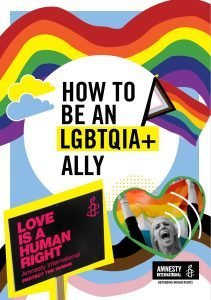The answers revealed
Keep an eye on your phone – we’ll be in touch to send you your LGBTQIA+ ally guide!

This guide presents simple and practical advice for all of us, as we strive to better support the LGBTQIA+ people in our lives and challenge discrimination facing the LGBTQIA+ community. Together, we can help build a safer, kinder and more equal world where human rights are enjoyed by all, regardless of who we love, how we dress or how we identify.
Question 1: Which is the best and most inclusive way to address a group of people?
Answer: a. The best and most inclusive way to address a group of people is using terms like “folks” or “everyone” that are gender neutral. This is inclusive of the diversity of gender identities that do exist.
Question 2: Why is this statement harmful?: “You’re a handsome young lad! I bet you’ll be a troublemaker with the ladies.”
Answer: d. All of the above. Statements like “You’re a handsome young lad! I bet you’ll be a troublemaker with the ladies” are harmful because they erase the lived experience of people with other sexualities and set an expectation that everyone is heterosexual, thus implying that people who are not heterosexual are “different” or “outside of the norm”. This is known as heteronormativity. As a society, our culture of heteronormativity has led to discrimination and inequality for people in the LGBTQIA+ community.
Question 3: What’s the best way to ask if someone is in a relationship?
Answer: b. The best way to phrase a question about if someone is in a relationship is by using gender neutral terms such as “partner”, “spouse” or “significant other”. This acknowledges the diversity of gender identities as well as sexualities that exist.
Question 4: Who does this statement exclude?: “Free menstrual products will be available on campus for women.”
Answer: d. All of the above. The statement “Free menstrual products will be available on campus for all women” excludes people who menstruate, who are not women, such as non-binary people who menstruate, transgender men who menstruate and intersex men who menstruate.
Question 5: Who can share their pronouns?
Answer: b. Everyone can share their pronouns! Pronouns are how we refer to someone with language other than their name (e.g. they/them, he/him, she/they, ze/zir, xe/xir). Sharing your pronouns with other people lets them know how to refer to you. It also helps to create a culture that is more inclusive and acknowledges the diversity of gender identities that exist, and doesn’t assume people’s pronouns.
You are part of a movement defending equality and demanding safety for all.
From all of us at Amnesty, thank you. Your support as an ally is changing lives.